The North Carolina Collaborative Attorney Network (NC-CAN) is committed to helping families across the state divorce in a healthy way by spreading awareness about the benefits of collaborative law. NC-CAN advocates for collaborative law and its countless benefits for not only the divorcing spouses, but also their children.
When families experience divorce, our member attorneys often get questions about materials and resources that can help their children through the process. We understand that this can be a difficult and confusing time, so we suggest explaining divorce to children through storytelling. This can be done in a variety of ways, but we have seen great success through children’s books.
These are powerful tools that can help explain separation, divorce, and life after divorce in a soft, comforting, and relatable way. Here are our 10 favorite books that explain divorce to children of varying ages:
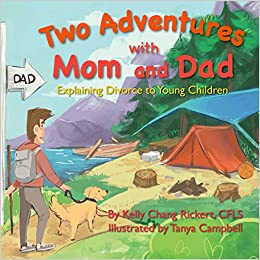
Two Adventures with Mom and Dad (Ages 2-8)
Meant for young kids, “Two Adventures with Mom and Dad” helps start the conversation at home on what to expect during the divorce process. This book is intended to be used as a road map for your child’s journey. It’s encouraged to be read together as it helps to start the dialogue at home on what to expect during the process. Written by a family law attorney, this book’s focus is to introduce children to the concept of divorce in an easy-to-understand way.
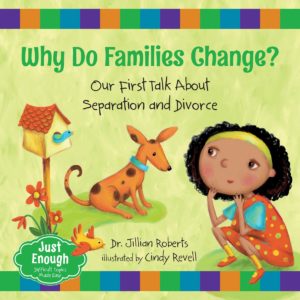
Written by child psychologist, Dr. Jillian Roberts, “Why Do Families Change” makes it easy to start conversations with young children about divorce. Using colorful illustrations and upbeat text, this book focuses on the fact that kids are loved, and divorce is not their fault. The author uses terms that are easy for small children to understand and makes them feel comfortable asking questions. She also emphasizes that kids may feel scared, angry, or sad and that’s okay.
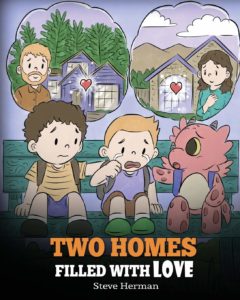
In “Two Homes Filled with Love,” Drew and his dragon help a friend during his parent’s divorce and help navigate his life living in two homes. Written by Steve Herman, a best-selling children’s books author, this is another adventure in the My Dragon Books series. The book focuses on how children are always loved and supported whether they live in one house or two. It also provides insight into what it’s like to have a friend whose parents are getting a divorce and how to have compassion.
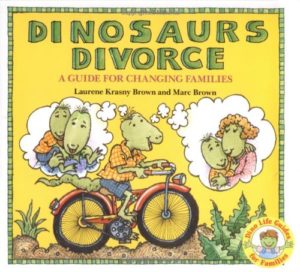
While “Dinosaurs Divorce” has been around since the 1980s, it has become a staple in recommended readings for young children experiencing the separation and divorce of their parents. The book is written by Marc Brown, the creator of the bestselling Arthur Adventure book series and Dino Life Guides series. For more than 30 years, changing families have used this book to talk about difficult moments while engaging young readers with cute dinosaur characters. It’s a practical roadmap for the early stages of divorce. It will help children understand what divorce is, why it happens, how to adapt to a blended family, and how to talk to friends about their parents’ divorce.
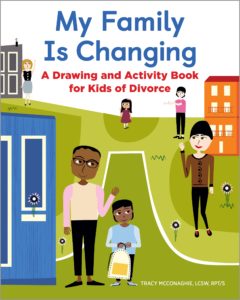
“My Family is Changing” is geared toward kids ages 5 to 7. It aims to help them process what’s happening through empathetic stories that feature a diverse collection of children. Each story serves as a starting point for activities and drawing pages. In addition, this book provides examples of several children going through a divorce, hoping that your child will connect with one. The author, psychotherapist and licensed clinical social worker Tracy McConaghie, specializes her professional work in divorce and parenting. In this story and activity book, she shares resources for children to share their feelings while staying focused on results.
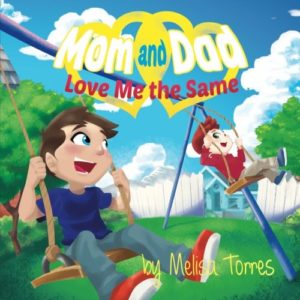
“Mom and Dad Love Me the Same” addresses children suffering from anxiety while going through a divorce. The main character William is worried about how his life will change when his parents tell him they’re getting divorced. As the year goes on, William realizes there are many differences, but also many things that stay the same. William explains his observations to the reader to help them understand divorce and focuses on the fact that his parents still love him.
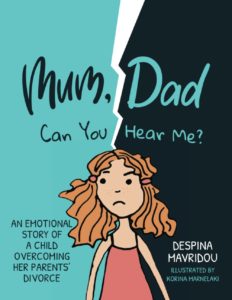
Appropriate for middle school-aged kids, “Mum, Dad, Can You Hear Me?” focuses on how children feel and what they need from their parents. In addition, we also recommend this book for parents who are looking to further understand their child’s perspective. When her parents begin fighting, the main character turns to her diary, grandmother, and a teddy bear to vocalize her feelings and let her parents know what she needs.
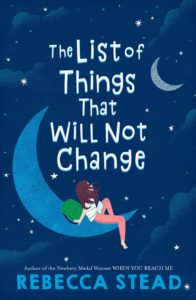
“The List of Things That Will Not Change” is an award-winning book for children and tweens written by American Newbery Medal recipient Rebecca Stead. The main character, Bea, is one that many kids can relate to. After her parent’s divorce, she experiences anxiety about the future and the unknown. To help her, Bea keeps a list in a green notebook to remind herself of all the things that will stay the same in her life. The most important thing being that her mom and dad will always love her. Throughout the story, Bea learns to adjust to having two different homes and the fact that her father is going to get remarried, and she’ll gain a sister. Bea is an excellent example of adapting, overcoming, and embracing life after your parents get divorced.
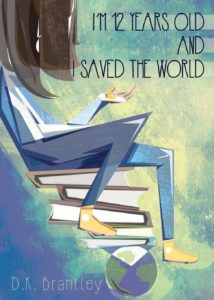
I’m 12 Years Old, and I Saved the World (Ages 9-12)
Often, parents do their best to shield their kids of all ages from relationship hardships and financial struggles. Kids are smart, though, and notice when something is off. In “I’m 12 Years Old, and I Saved the World,” the main character deals with navigating middle school and her parent’s marriage troubles in a heartfelt yet humorous way. The book admits that life can be complicated and doesn’t shy away from the fact that kids hurt when their parents hurt. It focuses on comforting those going through something similar and being empathetic to those around you.
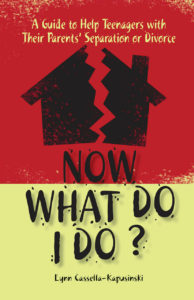
Meant for middle schoolers to kids in high school, “Now What Do I Do” is a workbook for tweens and teens that helps them figure out their feelings and fears.
This book’s goal is to help guide teens through their grief and difficulties following a divorce. Each chapter includes exercises and activities that focus on improving communication, dealing with anger, learning to forgive, and more.
We hope these children’s and young adult book recommendations will serve as a resource for your family as you navigate the process of separation and divorce and reality of going from one home to two. We believe that reading and providing books about divorce for your children is an essential way for them to learn, relate, and understand.
Founded in 2017, NC-CAN helps to ensure that couples in North Carolina facing the crisis of divorce are aware of the collaborative divorce option. Collaborative law can help to improve, rather than harm, existing relationships. For instance, instead of making things worse, collaborative-trained attorneys work to minimize hostility and conflict while focusing on constructive, mutually satisfactory solutions that reflect the needs and interests of the entire family.
It is our organization’s purpose to ensure that divorcing spouses can find attorneys in North Carolina who can provide the highest quality collaborative process. Our nonprofit s made up of experienced collaborative-trained attorney members who use this type of non-adversarial law in their own practices. You can find a qualified and committed collaborative law attorney in your area by clicking here.
NC-CAN is also proud to offer a resource guide on our website which serves as an additional way to learn about the collaborative divorce process. This guide provides additional details including the role of professionals, the interest-based negotiation model, understanding collaborative practice groups, and the North Carolina Statutes governing collaborative law proceedings. All proceeds from the guide are used to increase public awareness for the collaborative divorce option.
Please visit our website, www.nc-can.org, to learn more about collaborative law and the benefits of divorcing without destruction.
*The contents of this blog are intended to share general information only and should not be construed as legal advice.